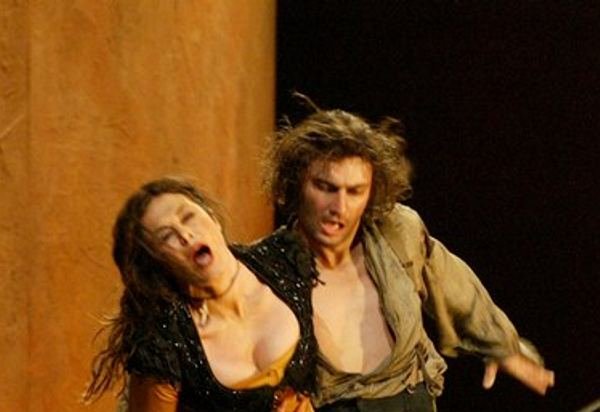|
|
|
|
|
|
|
|
| Classical Source |
| Alexander Campbell |
Bizét: Carmen, Royal Opera House, London, December 2006
|
Carmen
|
|
 This was the second performance of the Royal
Opera’s new production of “Carmen”, a co-production with Norwegian National
Opera (Den Norske Opera), which will open a new opera house in April 2008.
Covent Garden is obviously banking on this production being a success as it
has a long run over this festive period. At this performance the production
only took fire in the final scene; the earlier acts certainly had their
moments but were not always sustaining of the drama. This was the second performance of the Royal
Opera’s new production of “Carmen”, a co-production with Norwegian National
Opera (Den Norske Opera), which will open a new opera house in April 2008.
Covent Garden is obviously banking on this production being a success as it
has a long run over this festive period. At this performance the production
only took fire in the final scene; the earlier acts certainly had their
moments but were not always sustaining of the drama.
The current cast of the production has one absolute ace up its sleeve in
the form of the Bavarian tenor Jonas Kaufmann, who gives as complete a
performance as Don José as one could ever expect to hear. From the start not
only was the role superbly and subtly vocalised, but also the character’s
gradual decline was depicted not only in some great and natural acting but
also in the vocal character as well. Don José’s emotional aspect of the
character registered immediately and as the evening went on, increasing
frustration and desperation crept into the tone, matching his increasingly
shabby and shaggy demeanour. Kaufmann is not a tenor for histrionic effects,
however; the ‘Flower Song’ was beautifully lyrical, ending on a true
pianissimo, and his ringing tones in the final duet were thrilling as well
as upsetting.
Here, Anna Caterina Antonacci finally made one focus on and realise Carmen’s
tragedy, suddenly defiant and desperately longing for life in a situation
she knows is probably hopeless. She also seemed vocally happier at this
point and revealed herself the operatic actress she is known to be. Earlier
she seemed content merely to express the somewhat clichéd aspects of the
character – an earthy, liberated, and vulgar gypsy, although unusually, this
Carmen seemed to retain some feeling for Don José well into the third act.
Vocally Antonacci was secure, although her rather soprano-ish timbre meant
that she was almost out-mezzo’d by the slightly richer voice of Viktoria
Vizin’s Mercédès, when they were singing together. Antonacci does has a
luscious and alluring middle range which sits well in most of the part, but
what it lacks perhaps is penetrative power. Whilst not perhaps such an
all-round performance as Kaufmann’s she is a worthy partner to him.
Ildebrando D’Arcangelo’s Escamillo was a strong presence, firmly sung, and
acted with the necessary swagger, even whilst making his first entrance atop
a large black horse (unusual to bring your horse inside a tavern?). The
Micaëla of Norah Amsellem was disappointing. She acted the role well enough
within the confines of the production, but her voice lacks the richness that
the singer of the part needs in order to provide a vocal and dramatic foil
to Carmen. Ansellem’s voice is always somewhat tremulous, and not always
mellifluous in tone quality.
In the minor roles the bright and optimistic Frasquita of Elena
Xanthoudakis, and Matthew Rose’s Zuniga stood out, and it was a pleasure to
see and hear the inimitable Jean-Paul Fouchécourt turning in a cameo as a
crafty Le Remendado.
On the musical side things were also mixed. Pappano and his orchestra
launched into the famous opening with a gusto that only just missed being
labelled coarse, but elsewhere there was some fine playing, especially in
the famous interludes, and real swagger in the crowd scenes that open the
final act. Mention should be made of the excellent flute-playing in the Act
Three Prelude. The score played was not the most authentic with some of the
Guiraud-composed accompanied recitative creeping in on occasion. That the
conductor allowed his director to obliterate most of the lovely
orchestration of the dance that opens Act Two by some rather noisy dancing
and chorus whoops seemed odd, and Escamillo’s off-stage singing at the end
of the third act was far too close for someone who should be rather more
distantly heard. Surely the conductor should have said something and these
miscalculations been addressed?
Francesca Zambello’s production was mounted in Tanya McCallin’s elegant
rather simple and abstract designs, which are beautifully lit; the solid
scenery subtly invoking the settings of both internal and external scenes –
especially the mountain pass of Act Three. It thus seemed a bit perverse to
populate these settings with unnecessary and distracting realism of such as
live donkeys, horses and chickens and the like, and also to have many of the
smugglers, including Don José, abseiling down the scenery. It seemed that
the concentration was on directing superfluous detail at the expense of the
principals – Kaufmann excepted. Zambello’s previous flair for chorus
direction seems to have deserted her also. At times movement looked almost
formulaic – though it must be said the choral singers were on fine vocal
form. One wondered also why Lillas Pastia, who is usually a male character
(and one therefore assumes that historically it has always been so), should
have changed sex.
These may be minor irritations to the regular opera-goer – as a production
this will easily harbour many and varied casts and will prove an attractive
and straightforward presentation for those seeing the work for the first
time.
|
|
|
|
|
|
|
|
|
|
|
|
|
|
|
|
|
|
|